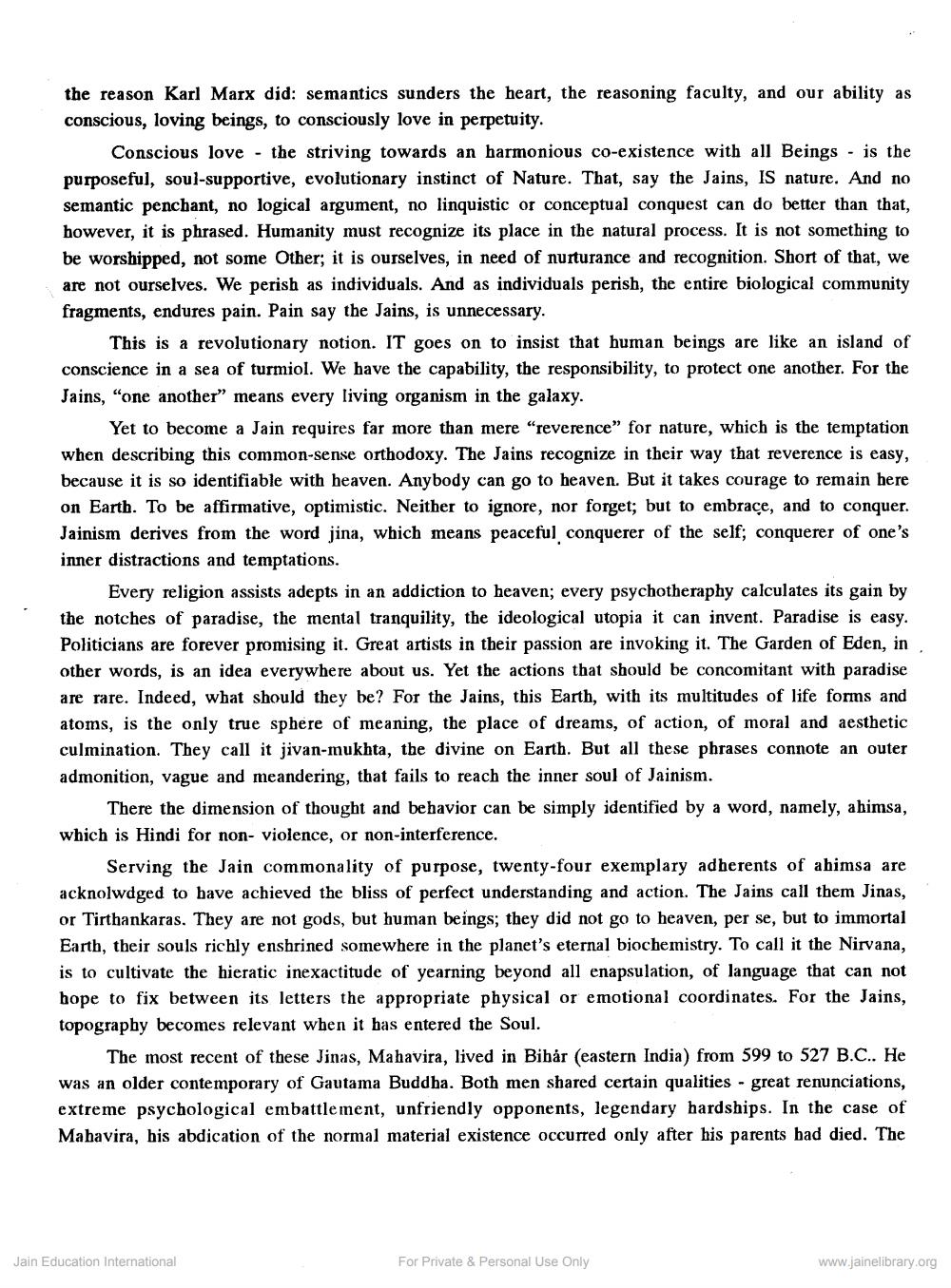________________
the reason Karl Marx did: semantics sunders the heart, the reasoning faculty, and our ability as conscious, loving beings, to consciously love in perpetuity.
Conscious love - the striving towards an harmonious co-existence with all Beings - is the purposeful, soul-supportive, evolutionary instinct of Nature. That, say the Jains, IS nature. And no semantic penchant, no logical argument, no linquistic or conceptual conquest can do better than that, however, it is phrased. Humanity must recognize its place in the natural process. It is not something to be worshipped, not some Other; it is ourselves, in need of nurturance and recognition. Short of that, we are not ourselves. We perish as individuals. And as individuals perish, the entire biological community fragments, endures pain. Pain say the Jains, is unnecessary.
This is a revolutionary notion. It goes on to insist that human beings are like an island of conscience in a sea of turmiol. We have the capability, the responsibility, to protect one another. For the Jains, "one another” means every living organism in the galaxy.
Yet to become a Jain requires far more than mere "reverence" for nature, which is the temptation when describing this common-sense orthodoxy. The Jains recognize in their way that reverence is easy, because it is so identifiable with heaven. Anybody can go to heaven. But it takes courage to remain here on Earth. To be affirmative, optimistic. Neither to ignore, nor forget; but to embrace, and to conquer. Jainism derives from the word jina, which means peaceful conquerer of the self; conquerer of one's inner distractions and temptations.
Every religion assists adepts in an addiction to heaven; every psychotheraphy calculates its gain by the notches of paradise, the mental tranquility, the ideological utopia it can invent. Paradise is easy. Politicians are forever promising it. Great artists in their passion are invoking it. The Garden of Eden, in other words, is an idea everywhere about us. Yet the actions that should be concomitant with paradise are rare. Indeed, what should they be? For the Jains, this Earth, with its multitudes of life forms and atoms, is the only true sphere of meaning, the place of dreams, of action, of moral and aesthetic culmination. They call it jivan-mukhta, the divine on Earth. But all these phrases connote an outer admonition, vague and meandering, that fails to reach the inner soul of Jainism.
There the dimension of thought and behavior can be simply identified by a word, namely, ahimsa, which is Hindi for non-violence, or non-interference.
Serving the Jain commonality of purpose, twenty-four exemplary adherents of abimsa are acknolwdged to have achieved the bliss of perfect understanding and action. The Jains call them Jinas, or Tirthankaras. They are not gods, but human beings; they did not go to heaven, per se, but to immortal Earth, their souls richly enshrined somewhere in the planet's eternal biochemistry. To call it the Nirvana, is to cultivate the hieratic inexactitude of yearning beyond all enapsulation, of language that can not hope to fix between its letters the appropriate physical or emotional coordinates. For the Jains, topography becomes relevant when it has entered the Soul.
The most recent of these Jinas, Mahavira, lived in Bihar (eastern India) from 599 to 527 B.C.. He was an older contemporary of Gautama Buddha. Both men shared certain qualities - great renunciations, extreme psychological embattlement, unfriendly opponents, legendary hardships. In the case of Mahavira, his abdication of the normal material existence occurred only after his parents had died. The
Jain Education International
For Private & Personal Use Only
www.jainelibrary.org




